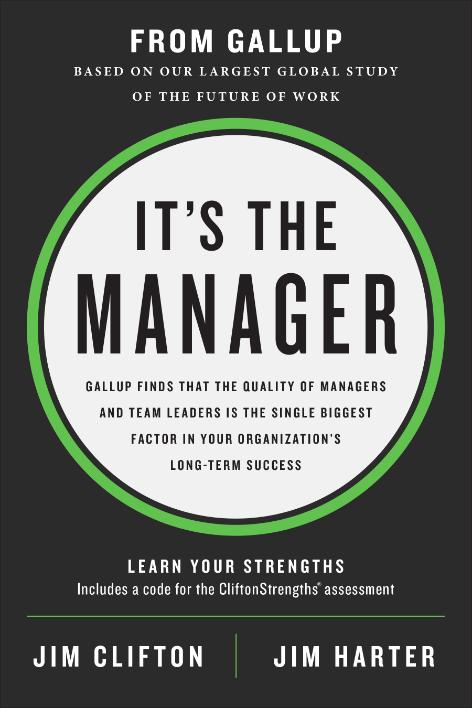Story Highlights
- The best companies know that employee development begins with strengths
- To improve your work culture, match talent to roles
- Create a strengths-based organization where your employees thrive
To put it simply, strengths-based company cultures consistently outperform others.
Employees thrive when they can contribute to organizational outcomes by doing what they do best. In turn, there's less friction -- and teams feel inspired to accomplish tasks.
In these kinds of cultures, people aren't working against how they're built. Instead, they're leaning into who they naturally are.
CEOs are better able to influence and drive their strategy forward in strengths-based cultures.
Workplaces focused on strengths development add a significant boost of enthusiasm to their cultural engine, which drives performance. In turn, goals related to innovation and reskilling are more attainable. Teams that have a clear understanding of what employees naturally do best can pivot quickly to apply that knowledge to what needs to get done now.
Gallup finds that CEOs who create this kind of culture see real performance outcomes. Workgroups that receive strengths-based development have achieved:
- 19% increased sales
- 29% increased profits
- 59% fewer safety incidents
- 72% lower turnover (in high-turnover organizations)
Strengths-based cultures yield these and other long-term benefits because they're a magnet for top talent.
One McKinsey study reported that many CEOs "worry about asking the same few overstretched 'usual suspects' to take extra assignments because they can't trust the people who would otherwise perform them. The best CEOs take a methodical approach to matching talent with roles that create the most value."
How Coaching Fosters Employee Development
Gallup research shows that people perform better when they're selected for a role they have talent for -- and when they get coaching from a great manager about their strengths and connect with their organization's mission, they perform better still.
So, CEOs reap the greatest returns when they select based on talent and create strengths-based cultures that draw high-caliber candidates in the first place.
Teams that have a clear understanding of what employees naturally do best can pivot quickly to apply that knowledge to what needs to get done now.
When Gallup consultants work with CEOs and their teams on a culture effort like this, they start by simply getting to know the organization. Once they identify what's working well and any opportunities for improvement, they partner with the executive team to define their ideal state and align on key actions and an implementation plan.
While employing a strengths-based approach yields clear performance benefits, like any other change effort, it is an investment for the long run. How much time, energy and investment are needed just depends on where things are currently as they relate to the ideal state.
This doesn't mean that CEOs need to blow up their unique culture. Not by a long shot.
Cultures are as unique to organizations as personalities are to humans. Leaders' aim should be to maximize core aspects of their unique culture that yield positive benefits while mitigating the aspects that are not serving performance. Throughout this process, leaders should underpin everything with a strengths-based approach to coaching employees.
All of this must start with the CEO.
What (and how much) needs to happen depends on the existing state of the culture.
Why You Should Build a Strengths-Based Culture
Some organizations may have a lot to do, starting with helping everyone to discover their strengths -- what it is that they are best at. In other cases, leaders may need to consider whether managers are assigning projects and developing employees based on what they do best. Some may decide that management could be better and that they need a new way to pick their managers in the future -- meaning selection systems need updating. Or they may discover that they have more star managers than they realize, and choose to invest in those managers to help them raise the bar through research-based education. In yet other cases, it may mean updating performance management and incentive systems.
No matter where a company is on the "building a strengths-based culture" spectrum, the CEO needs to lead the charge by communicating their expectations for creating a strengths-based organization.
Making a strengths-based approach a core pillar of their cultural strategy leads to clear business outcomes. It boosts their ability to make their strategy happen. It's what attracts and retains top talent.
But, all in all, the why is more profound.
The why is about recognizing the innate talents that make each human unique and then developing those humans through what they do best at work every day.
It's about building a workplace where everyone is known for their strengths -- where everyone uses the same language from the start, and where the whole is greater than the sum of its parts because each person contributes their part based on what they do best as they achieve their company's mission together.
No matter where a company is on the "building a strengths-based culture" spectrum, the CEO needs to lead the charge by communicating their expectations for creating a strengths-based organization.
It looks like a company where people want to come to work and where a lot gets done -- but the getting stuff done is fun because it happens alongside supportive partners who learn and grow and perform while they apply the best of themselves in their work every day.
You can feel it when you enter the room in a company like this. It just feels different. The energy and intensity and positivity are high. It feels like everyone is going somewhere they want to be together and getting something done that matters.
This is the why that draws the best and the brightest to want to work in the kind of culture this CEO creates.
Give every employee the opportunity to discover their strengths:
- Listen to this webcast on How to Create a Strengths-Based Culture in Your Organization.
- Find the CliftonStrengths assessment that's right for you.
- Download our perspective paper, How to Create a Strengths-Based Organizational Culture.




